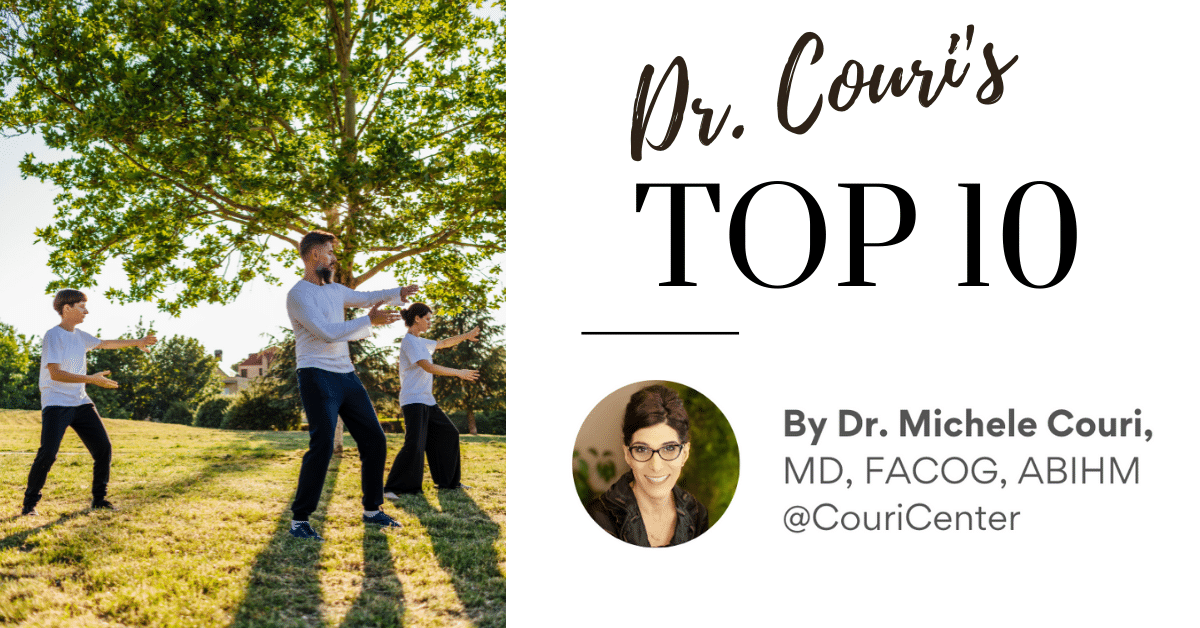
10 Health Benefits of Tai Chi
Tai Chi is an ancient Chinese tradition, a type of meditative martial art, that is a system of gentle physical exercise and stretching. It is composed of a series of repetitive, graceful movements that not only relax the body and mind, but also strengthen them as well. Because tai chi is low impact and puts no strain on the joints or muscles, it is appropriate for men and women of all ages and all fitness levels. What exactly are the benefits of tai chi and what is the scientific evidence supporting its practice? The scientific data on the benefits of tai chi is substantial. Between 1958 and 2013, there have been more than 500 studies on tai chi from 21 countries. Rest assured that the data overwhelmingly supports the practice of tai chi for many medical conditions.
- Prevention of falls in older adults– research has consistently shown that people who practice tai chi have a lower risk of falling, mainly due to the improvement in balance seen in those doing tai chi on a regular basis. One study identified tai chi as the most cost-effective option to prevent falls.
- Improvement in pain from osteoarthritis – tai chi has been shown to reduce the pain associated with osteoarthritis involving the knees, hips and hands. Both pain and physical function can improve in patients who practice tai chi. Tai chi is recommended by the American College of Rheumatology.
- Improvement in Parkinson’s symptoms – men and women with Parkinson’s Disease who practice tai chi were found to have better mobility and balance compared to those who do not.
- Improved lung function in COPD and asthma – studies show patients with COPD and asthma who practice tai chi have less shortness of breath, greater forced expiratory volume, and improved exercise tolerance.
- Better cognitive function – tai chi improves cognitive performance including improved attention and quicker processing speed.
- Less depression – studies that evaluated tai chi’s effect on depression have shown that tai chi can reduce the severity of depression. Studies looking at the correlation between tai chi improving depression symptoms are all consistently positive.
- Improved cardiac function after myocardial infarction (heart attack) – studies have shown that tai chi improves cardiac function and functional capacity after myocardial infarction. It has been shown that tai chi is an effective alternative for those patients who cannot attend traditional cardiac rehab.
- Improvement in mental functioning among patients with dementia – studies show that in patients with dementia, compared to physical exercise, tai chi was associated with better executive functioning. Mini-Mental State Examination scores improved in those individuals who regularly engage in tai chi.
- Improvement in high blood pressure (HTN) – a study in the American Journal of Cardiology has shown that tai chi can lower blood pressure and improve BMI (body mass index) in the elderly. Tai chi has been shown to effectively lower both systolic and diastolic blood pressure.
- Better bone density – Long-term practice of tai chi can improve osteoporosis. A study of individuals who regularly performed tai chi for at least 9 months had a significant increase in bone mineral density of the hip compared to those individuals who did not perform tai chi.
In health,
Michele Couri, MD, FACOG, ABIHM
Resources:
Houston, P and McFarlane, B. Health Benefits of Tai Chi; What is the Evidence?: Canadian Family Physician Vol 62: November, 2016, 881-890.
Tai Chi; A Gentle Way to Fight Stress: Mayo Clinic
Jahnke R, Larkey L, Rogers C, Etnier J, Lin F. A Comprehensive Review of Health Benefits of Qigong and Tai Chi. Am J Health Promot. 2010 Jul-Aug;24(6):e1-e25.
